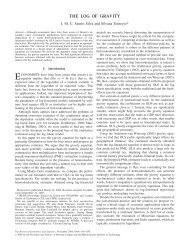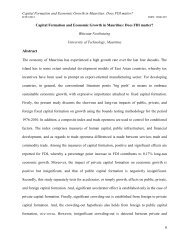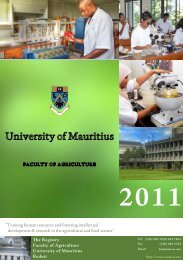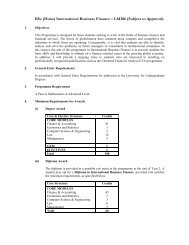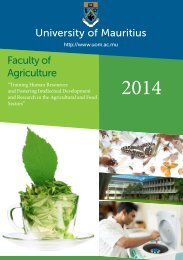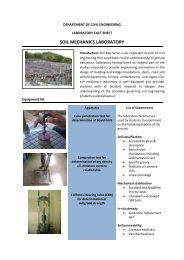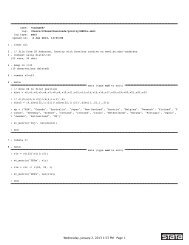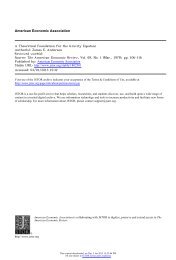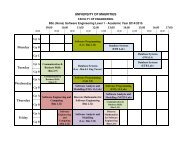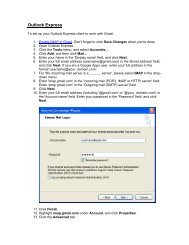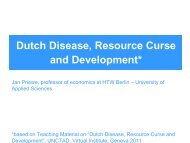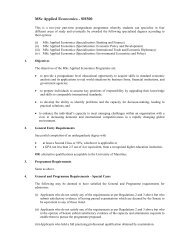SACU Revenue Sharing Formula - the University of Mauritius
SACU Revenue Sharing Formula - the University of Mauritius
SACU Revenue Sharing Formula - the University of Mauritius
Create successful ePaper yourself
Turn your PDF publications into a flip-book with our unique Google optimized e-Paper software.
ICITI 2012 ISSN: 1694122532 This can be presented as:R i =Where R i = Total Import Duty <strong>Revenue</strong> <strong>of</strong> Country i in <strong>the</strong> customs uniont j = common external tariff on product jM ij = imports into country i <strong>of</strong> product j from outside <strong>the</strong> customs unionIn reality though <strong>the</strong> formula is generalizable, as in <strong>the</strong> case <strong>of</strong> <strong>SACU</strong> and some countries in UEMOAwhere transfer payment are made. Therefore <strong>the</strong> generalised equation should be:R i = + T iT i = Transfer to country i from o<strong>the</strong>r members <strong>of</strong> <strong>the</strong> customs union33 As long as any border tariff in any member <strong>of</strong> <strong>the</strong> customs union e.g. Botswana were less that <strong>the</strong> decrease incosts from bulk purchase <strong>the</strong> entrepot trade would continue irrespective <strong>of</strong> <strong>the</strong> trade regime in place betweenmembers <strong>of</strong> <strong>the</strong> customs union.34 <strong>SACU</strong> does have a complex rule <strong>of</strong> origin See Schedule 1, Part 1 <strong>SACU</strong> 2002.35 Thus in order to obtain <strong>the</strong> total benefit <strong>of</strong> customs union membership equation above must be modified toinclude <strong>the</strong> net external benefits to each member which producesNB i = R i +NB i = + T i +WhereWhere R i = government revenue for country i from <strong>the</strong> customs unionchange in cost <strong>of</strong> producing in country iThe stability condition for <strong>the</strong> customs union is:36 Leith found that <strong>SACU</strong> RSF had resulted in decreases GDP/capita in Botswana.37 SADC FTA – Article 3. By January 2008 85% <strong>of</strong> HS tariff lines were duty free. „Guide to <strong>the</strong> SADC protocol onTrade‟ SADC Secretariat -2008. 15% <strong>of</strong> tariff lines leave considerable room for member states to maintain sometariffs against imports from o<strong>the</strong>r contracting partners. Moreover, despite „commitments‟ made to implement by2008 many countries have not yet fulfilled <strong>the</strong>ir commitments under <strong>the</strong> trade protocol.38 The average <strong>SACU</strong> binding is approximately 8.6% though each member <strong>of</strong> <strong>SACU</strong> made separate MFN bindingduring <strong>the</strong> Uruguay Round. Lesotho‟s bindings are much higher than that <strong>of</strong> <strong>the</strong> rest <strong>of</strong> <strong>SACU</strong>.39 World Bank (2009) „World Development Report –Reshaping Economic Geography‟ Washington40 In <strong>the</strong> case <strong>of</strong> Botswana diamond exports and prices toge<strong>the</strong>r explain 91% <strong>of</strong> GDP per capita over <strong>the</strong> last 30years. This also reflects relatively good governance in Botswana because, if <strong>the</strong> data existed, a similar regressionanalysis for DRC, Angola or Sierra Leone would be very unlikely to explain GDP per capita.41 “The South Africans have formally proposed a change in <strong>the</strong> revenue sharing formula, which is discussed as part<strong>of</strong> a blueprint to overhaul <strong>the</strong> customs union,” confirmed Kuukongelwa-Amadhila‟s permanent secretary CalleSchlettwein, who is in charge <strong>of</strong> <strong>the</strong> <strong>SACU</strong> working group tasked with this matter. It seems South Africa wants asystem that instructs <strong>the</strong> BLNS countries to submit development plans that will be financed through <strong>the</strong> pool, instead<strong>of</strong> <strong>the</strong> union bankrolling national budgets. Source Tralac http://www.tralac.org/cgibin/giga.cgi?cmd=cause_dir_news_item&cause_id=1694&news_id=84137&cat_id=102642 See Centre for International Economics (for <strong>SACU</strong> Secretariat) „Study on <strong>the</strong> Review <strong>of</strong> <strong>the</strong> <strong>Revenue</strong> <strong>Sharing</strong>Arrangement for <strong>SACU</strong>‟, March 2011, Canberra43 It is <strong>the</strong> understanding <strong>of</strong> <strong>the</strong> authors that <strong>the</strong> <strong>SACU</strong> members have never approved any <strong>of</strong> <strong>the</strong> studies that <strong>the</strong>yhave commissioned.44 The data on polarization <strong>of</strong> trade and economic activity in <strong>SACU</strong> with <strong>the</strong> resulting structuralimbalances is unambiguous. The BLNS produce largely raw materials for export to SA and import a widerange <strong>of</strong> agricultural, manufactured and intermediate goods as <strong>the</strong> most recent intra-<strong>SACU</strong> trade data35



